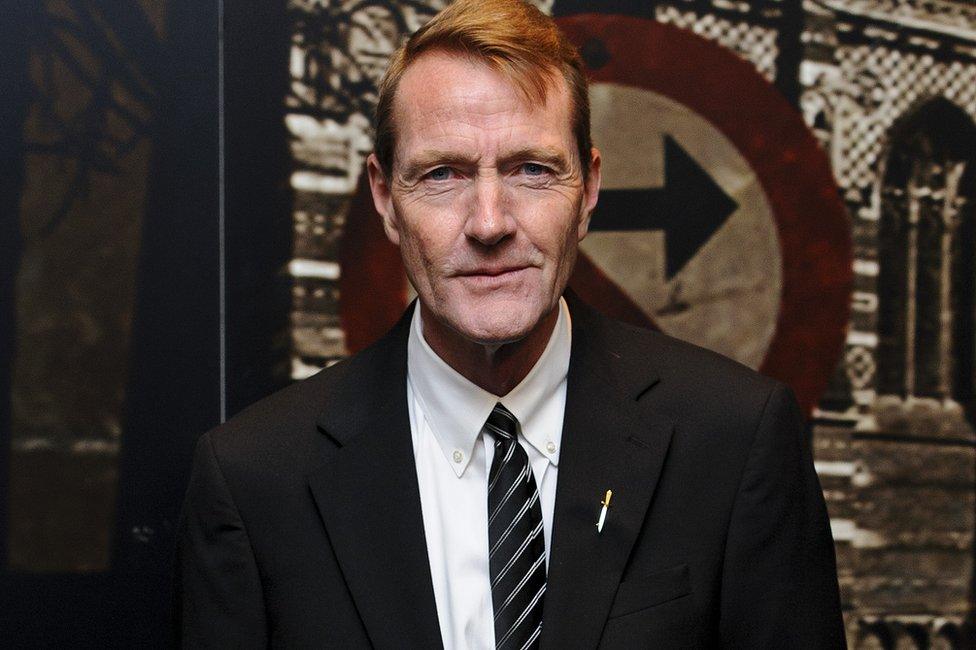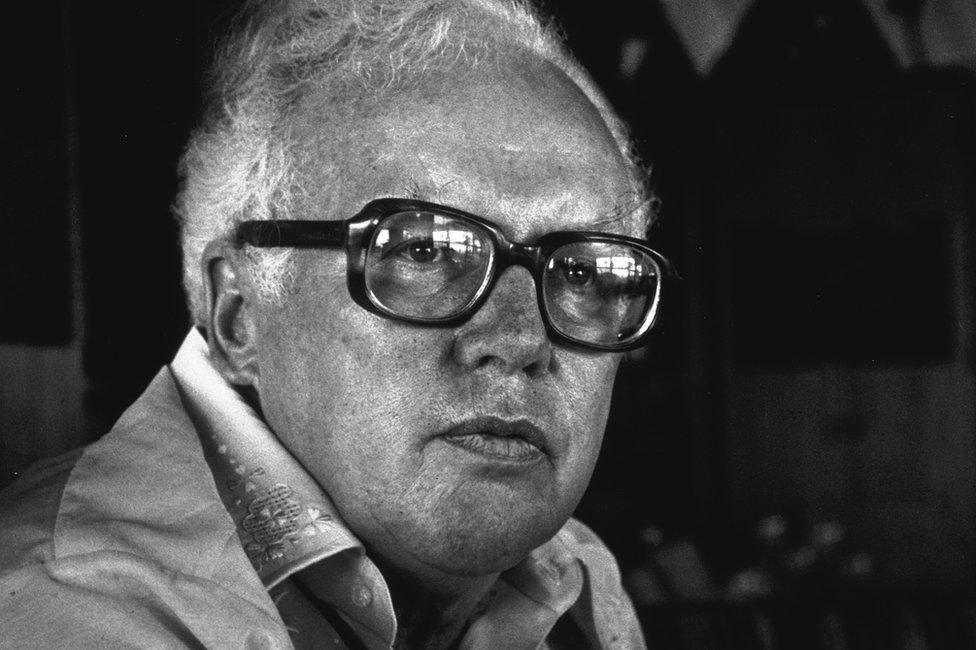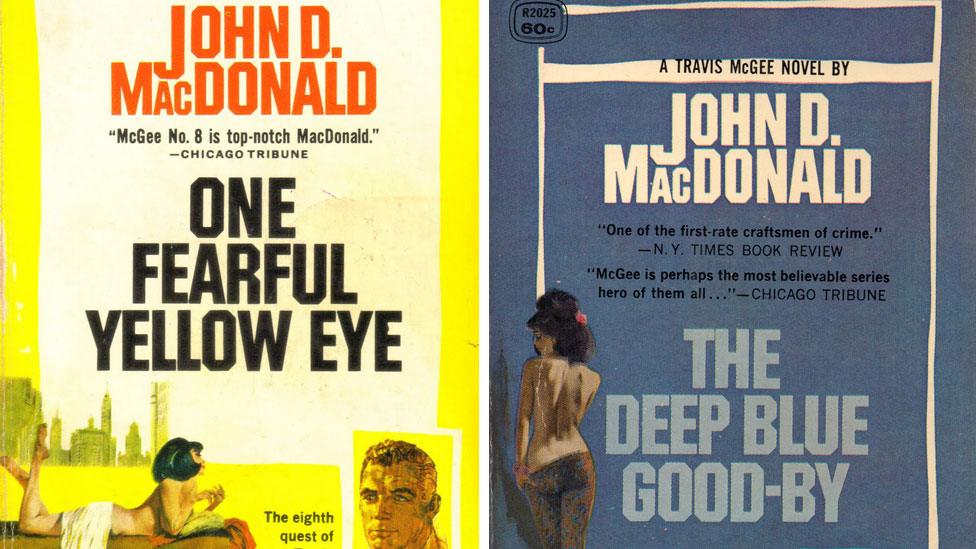Lee Child: Celebrating mystery fiction master MacDonald
- Published

Lee Child will shortly be publishing Night School - his 21st Jack Reacher thriller
John D MacDonald's Travis McGee series is one of the finest in mystery fiction. But the real mystery is how he became an author at all. As the author of the Jack Reacher series, I explore my fascination with the writer in a forthcoming Radio 4 programme, 21 Shades of Noir: Lee Child on John D MacDonald.
It has always intrigued me. Why would an affluent intelligence officer destined for the corporate corner office become a penniless writer of pulp fiction? I draw my own conclusion in the documentary, and in the best tradition of suspense fiction, I won't reveal it here.
But it's the story of a man who upon finishing his wartime service, found personal liberation behind a typewriter.
John D MacDonald was born in 1916 into a gilded, upper middle class lifestyle in Sharon Pennsylvania. He volunteered for army service in 1940, was commissioned as an officer and finished the war as a serious, bespectacled Lieutenant Colonel in intelligence.
This was the American Century: unprecedented prosperity was all around, and a new person was about to emerge - the corporate executive. Ninety-nine out of 100 men like him were taking their Harvard MBAs to General Motors, IBM or the Pentagon.
Instead, MacDonald sat at a battered kitchen table and banged out 800,000 words before eventually selling a story to a magazine for 25 bucks. He lost 20lbs in the process.

John D MacDonald was "a businessman as well as a writer," says Lee Child
The 21 Travis McGee books have been an inspiration to me. McGee is a Florida boat bum - a so-called salvage consultant. If you lose something, McGee can get it back, but always for a 50% cut.
The plots are great and the conclusions are always satisfying but MacDonald takes time out to explore his own fears about the environment and runaway consumerism. He was ahead of his time in that regard.
He was also an innovator when it came to marketing. One man with an insight into this was the long-time editor and publisher Otto Penzler.
"He was the first person I heard of who would note down the name and address of anyone who sent him a fan letter," Penzler says.
"When he had a new book coming out he would have an assistant write out envelopes and stuff them with fliers to say 'this is the new book by John D MacDonald'.
"He was a businessman as well as a writer."
This was fascinating as an early incarnation of advice given to the modern novelist - always keep your mailing list up to date.
The colour-coded titles of the Travis novels, from 1961's The Deep Blue Good-By to The Lonely Silver Rain in 1985, were a triumph of branding. The titles were instantly recognisable to his many fans.
Penzler says MacDonald may have been an accomplished novelist but he was also a Harvard MBA, a man who understood business and who wanted to make money from his work.

John D MacDonald's depiction of female characters was sometimes "dreadful", says cultural critic Susan Isaacs
Penzler adds: "I don't think he needed to make too much money, he came from some wealth, but he was certainly interested in promoting his books."
Another revelation was the astonishing productivity of writers like MacDonald. I'm considered prolific by modern standards but can't compare to some of the guys in the documentary. It was a pleasure to speak to Lawrence Block, a crime writer whose immense body of work spans the old days and the new.
Block says he has no idea how many books he has written but estimates it at somewhere below 200 but well over 100.
"I know so many writers who were similarly prolific," he says.
"Bob Silverberg, a giant of science fiction... was doing two a month for one publisher, another for a second publisher, and the equivalent of another book for a magazine.
"He was writing a quarter of a million words a month."
Block suggests that intense work rate was not uncommon. But for modern readers there is a note of caution.
While the marketing and the environmental concerns may have been ahead of their time, the gender relations were definitely not.

Lee Child (in the Radio 4 studio) says MacDonald's work left him "with the impression that if I needed to write a book, I could"
In the documentary the novelist and cultural critic Susan Isaacs allows herself a sharp intake of breath at MacDonald's description of one female character, but draws an interesting conclusion about his ability to convey the rounded reality of their backgrounds and occupations - something lacking in a lot of the genre fiction of the time.
She said: "He was capable of being dreadful - but not that often.
"I think he was relatively balanced, he saw women as humans but not fully human because [Travis] was always saving them.
"Unlike Jack Reacher he never meets women as equals. They're always wounded, they're always hurting. In many cases he's saving them from the evil that they meet - and they meet a lot of evil."
I read the Travis McGee novels five years before beginning my own Jack Reacher series and for the first time I was given a sense of "the skeleton beneath" the writing. I could see what MacDonald was doing, how he was compelling me to read on. I was left with the impression that if I needed to write a book, I could.
21 Shades of Noir can be heard on Radio 4 at 1130 on Thursday 13 October.